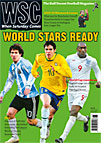 FIFA's approach to safeguarding profit from this year's football tournament is particularly aggressive. Simon Cotterill reports
FIFA's approach to safeguarding profit from this year's football tournament is particularly aggressive. Simon Cotterill reports
FIFA has generated a record $3.3 billion (£2.2bn) in marketing and television rights ahead of this summer’s World Cup. Big brands have paid big money for association with the tournament. In return they’ll be protected by FIFA’s strict trademark regulations which prevent unofficial associations diluting the messages of official sponsors. Many in South Africa have criticised the heavy-handed way FIFA have been enforcing their often ridiculous regulations.
The football world’s governing body state you can’t sell a T-shirt with “2010” written on it if there is “any kind of link to football”. Pubs can’t even write “watch 2010 games here” on their chalkboards, but must instead put “watch the football” or “today’s game”. And FIFA’s disruption of day-to-day life has penetrated far deeper than this.
When their country won the right to host this year’s tournament, or event as it is preferred we call it, many South Africans were dancing in the streets. But preparations have since seen FIFA demand that many people, along with their homes and business, are removed from these streets. City governments have forcibly pushed homeless people out of town at FIFA’s request that they deal with “the homeless issue”. According to Johannesburg city official Sipho Masigo “you have to clean your house before you have guests”.
Matches usually provide vendors with a necessary opportunity to sell their wares on the street. But there will be no sign of South Africa’s vibrant informal trade sector around stadiums this summer. “A stadium is a FIFA perimeter,” explains secretary general Jermone Valke. “Within this perimeter there are people who have rights to do things and people who have no rights.” There seems very little about this summer’s event for poorer South Africans to dance or cheer about any more.
One of South Africa’s smaller companies has hit back, however, in a way that has delighted the nation. In March this year, budget airline Kulula was told by FIFA that it must remove advertisements referring to themselves as “the unofficial carrier of you know what”. According to FIFA, this slogan amounted to “ambush marketing” and Kulula, known for their quirky ads, had sought “to gain a promotional benefit by creating an unauthorised association with the 2010 FIFA World Cup”.
Kulula complied by removing their offensive promotion and even apologised, knowing FIFA’s complaint had triggered much free publicity. The advert had used the national flag, footballs, a stadium and the vuvuzela, and, according to FIFA, it was the “combined use of these elements” which is banned. So with that in mind the budget airline embarked on a follow-up advertisement.
A week or so later, Kulula paid for another newspaper page. On it this time: a bridge, which without careful inspection appears to be the Cape Town World Cup stadium; golf tees, which look like vuvuzela but are each labelled “definitely, a golf tee”; cloth in the national flag’s design, which is labelled “colourful beach towel?”; and a man standing in a footballer-like pose wearing football boot-like footwear, but without studs. The caption states: “They’re running shoes.”
The main slogan of this second ad was: “Not next year, not last year, but somewhere in between.” Again, FIFA were not happy. South Africa’s popular Noseweek magazine has suggested FIFA’s complaints against Kulula may be motivated by the fact that the airline charge between $140 and $196 for flights that the Match company, exclusively endorsed by FIFA to sell tickets and travel, offer for $755. Match are run by Sepp Blatter’s nephew Philippe and, with prices showing no awareness of the global economic downturn, they are probably very lucky that Philippe’s interests are being looked after by such a powerful elder relative.
Many commentators have already suggested that with the homeless and the street traders removed, the world’s cameras will be presented with a much sterilised version of South Africa this summer. The guest rooms have been tidied and the undesirable family members are all hidden away, behind policed doors. But while FIFA’s aggression produces many reasons to approach this summer’s “event” with some solemnity, Kulula continue to provide reason to smile.
The airline’s latest action has been to create a law firm, Mujat and Sons, and to notify FIFA of their application to trademark the sky. The move apparently follows “widespread unauthorised use of images of the sky”– Kulula’s primary place of business. Kindly, Kulula will allow any use of Sky™ under 10,000 feet, as they “have to leave room for marketers and the media to breathe”. But FIFA and the television companies they endorse will now need to consider just how much blue is visible at the top of their official, authorised imagery from now on.
From WSC 280 June 2010